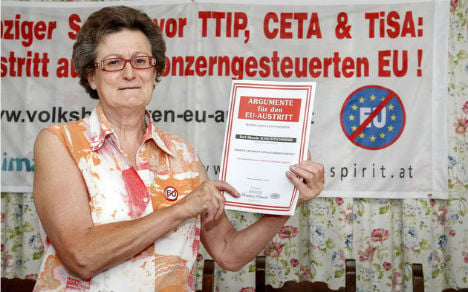The petition was initiated by 66-year-old Inge Rauscher, who also launched a petition back in 2000 which was only signed by 3.35 percent of the electorate.
The retired translator has been against EU membership ever since Austria joined the union.
Last year she collected 9,971 signatures – enough to start the current petition which requests that parliament should make a decision on Austria’s withdrawal from the EU by holding a referendum.
She and her supporters believe that Austria would be better off without EU membership – economically, socially and environmentally.
At a press conference to launch the petition, Rauscher said that the EU is undemocratic, and that laws are adopted by commissioners who are not elected by the people.
“We want to go back to a neutral and peace-loving Austria,” she said, adding that Austria is presently forced to endorse economic sanctions against Russia. She also said that she believes the EU is responsible for the economic downturn.
She argues that withdrawal from the EU would lead to welfare gains of up to €9,800 per household per year, because Austria would no longer have to help fund the EU administration.
The petition is available to sign in municipal or district offices. Austrian citizens aged 16 and over are eligible to sign – so around 6.4 million people.
In order for a referendum to be discussed in parliament, the petition must gather 100,000 signatures.
Recent polls show that only about one third of Austrians would be in favour of leaving the EU. Both the right-wing Freedom Party and the Team Stronach party are Euro-sceptic.



 Please whitelist us to continue reading.
Please whitelist us to continue reading.
Member comments